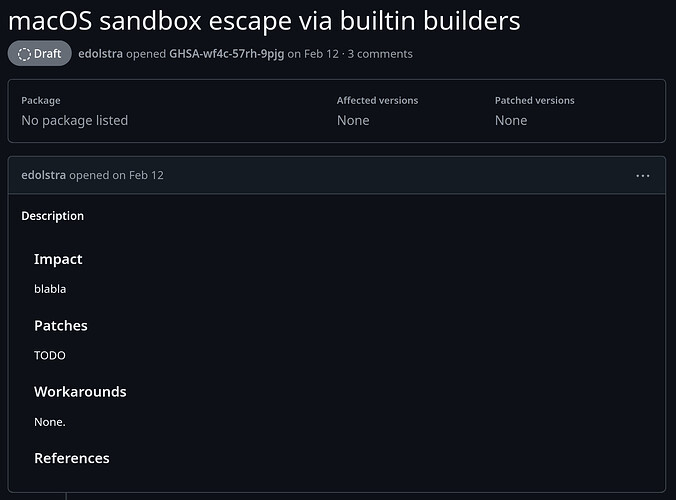I think people here are pretty set in their positions. I think I’ll make my final point: no amount of after the fact denial will change the consequences of this neglect.
For what it’s worth, I am a person that works on critical infrastructure relying heavily on NixCpp, and I’m also someone with a non-trivial FOSS project, that has participated in handling security issues that were embargoed.
Considering this, it’s my view that there are several clear failures here, and likewise, when interacting with peers that don’t have a bias towards presuming the NixCpp team to be infallible, this is something they find concerning. No matter how defensive people are on online forums, this is something professionals and users are noticing, and no amount of arguing will detract from the reality that NixCpp delivers persistent security failures due to their pathological inability to take ownership.
The amount of conspiratorial and paranoid thinking I’m seeing in this thread is also a clear example of how these failures will keep on continuing if the course isn’t corrected soon. It seems obvious to me that if Lix developers were seeking to harm the project, they simply wouldn’t inform with NixCpp team anymore. The entire Lix project seems driven directly as a response to all of these persistent failures in the very basics of how to maintain and operate an open source project, whether those be release engineering failures, security failures, inability to onboard new contributors, the list just keeps on going.
I’m in no means a Lix “true believer”. I’ve waited to even attempt using it before it had it’s second stable release, because I had very low trust in an alternative being able to deliver a better product than that of several veteran contributors, or it just being a “side project”. It was only last month that I even started taking it seriously and have been “skunkworking” testing it for various projects (for example, nix-weather). And even then, I’m extremely cautious to consider deploying it in production, given it’s simply a very new project, and it’s not yet clear if it will be able to continue as the dust settles and the years go on. FOSS maintainership is hard, and simply from existing for a long time, NixCpp gets a lot of points.
After the 2.24.4 incident, I’ve noticed a marked interest in moving to Lix at my dayjob, as well as a general interest from other peers, primarily for security reasons. And I personally am still against that, for reasons I’ve outlined above, and because there is a very reasonable chance that this could be “the wakeup call” to the NixCpp team.
But, I think my outlook is shifting to NixCpp being “default dead”, in the sense that I’m not sure it’s defensible anymore to use it for anything security critical, and I think at best, one more incident like this, and I will no longer be asked whether or not we should move to Lix, I will be told to move us.
There isn’t any arguments on an online forum that can shift this reality. And I think NixCpp failing in these areas would be a massive loss to the Nix ecosystem in general, having alternatives is very important for the strength of the project, whether or not you’re “team lix” or “team nix” is completely irrelevant from a technical perspective, the existence of an alternative seems to be driving both projects to create much better software, and the loss of that effect would be a shame.
Heck, just recounting this to myself is making me question my own position that there is anything to be gained for staying on NixCpp. We broke past the trust thermocline last year, and we’re just stumbling in the ruins of the consequences of that, and perhaps instead of arguing with people on the internet in the hopes that some moment of clarity comes to the people in charge, like we’ve done countless times before only to be ignored… maybe I should just accept that it’s falling on deaf ears, and that NixCpp is another darling that has to be killed.
Regardless, that’s my last reply in this thread.
